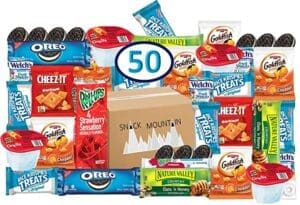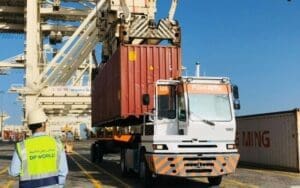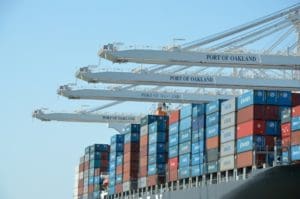 Artificial intelligence has been applied to just about every supply chain application imaginable, including transportation management and execution, demand planning, supply chain planning, warehouse management, and order management. It has also been embedded in autonomous trucks, robots, and drones for navigation. There are myriad applications outside of the supply chain world as well, but I saw a new one this week: writing a Metallica song. Metallica is one of my favorite bands, so this application intrigued me. Last month, satirist Funk Turkey created an AC/DC song using AI; and he is at it again. To create the song, he used lyrics.rip to scrape the Genius Lyrics Database and made a Markov Chain write Metallica lyrics. He then wrote the music, recorded, and mixed it in his house. The end result was the song “Deliverance Rides.” While it may not be the best song in the world, it is an impressive use of AI for musical sake. And now on to this week’s logistics news.
Artificial intelligence has been applied to just about every supply chain application imaginable, including transportation management and execution, demand planning, supply chain planning, warehouse management, and order management. It has also been embedded in autonomous trucks, robots, and drones for navigation. There are myriad applications outside of the supply chain world as well, but I saw a new one this week: writing a Metallica song. Metallica is one of my favorite bands, so this application intrigued me. Last month, satirist Funk Turkey created an AC/DC song using AI; and he is at it again. To create the song, he used lyrics.rip to scrape the Genius Lyrics Database and made a Markov Chain write Metallica lyrics. He then wrote the music, recorded, and mixed it in his house. The end result was the song “Deliverance Rides.” While it may not be the best song in the world, it is an impressive use of AI for musical sake. And now on to this week’s logistics news.
- Packaged food companies stocking up on ingredients in case of supply chain disruptions
- Cross-border postal rates going up July 1 for many shippers
- FMCSA cancels HOS exemption for food, fuel, raw materials
- DGWorld to boost Jebel Ali Port with autonomous vehicles
- Instacart partners with Big Lots to deliver groceries, home goods
- How Imperfect Foods adapted to doubled order volumes during COVID-19
- US retail imports remain low, but not as low as previously forecast
- Patrón launches cocktail party on Amazon
 Historically, the packaged food industry has relied on just-in-time inventory practices to minimize storage costs. However, there has been a drastic shift in the market. Now, these companies are spending cash to stock up on ingredients as fears of more supply chain disruptions grow. The coronavirus turned the supply chain upside down as key ingredients saw shortages, resulting in less production and products on supermarket shelves. Companies like Campbell’s and Bobo’s are stocking up on products like oats and sugar to ensure they can maintain production in the event of more supply chain disruptions. By buying 50 percent more ingredients, these companies have a 90-day safety stock of ingredients for core products. Additionally, supplies may be diverted from items that are not selling as well to better selling products. This is all part of the industry’s contingency plan in case the country sees another spike in coronavirus cases, either when economies re-open or cooler weather hits at the end of the summer.
Historically, the packaged food industry has relied on just-in-time inventory practices to minimize storage costs. However, there has been a drastic shift in the market. Now, these companies are spending cash to stock up on ingredients as fears of more supply chain disruptions grow. The coronavirus turned the supply chain upside down as key ingredients saw shortages, resulting in less production and products on supermarket shelves. Companies like Campbell’s and Bobo’s are stocking up on products like oats and sugar to ensure they can maintain production in the event of more supply chain disruptions. By buying 50 percent more ingredients, these companies have a 90-day safety stock of ingredients for core products. Additionally, supplies may be diverted from items that are not selling as well to better selling products. This is all part of the industry’s contingency plan in case the country sees another spike in coronavirus cases, either when economies re-open or cooler weather hits at the end of the summer.
 On July 1 many US shippers will see an increase in cross-border shipping rates. This is due to the fact that countries can begin to self-declare postal rates as part of a deal reached by the Universal Postal Union (UPU) back in September. Cross-border postage rates represent the combination of three services: domestic service by the postal carriers in the country of origin; foreign postal service that takes over the parcel or mail after it crosses the border into the destination country; and handling costs of the service provider. These new shipping rates will be highly variable, but initial estimates see USPS inbound rates from China increasing 100 percent and shipping costs to Canada increasing about 50 percent. Among the companies that have received new contracts with the USPS are DHL eCommerce, FedEx Cross Border, Pitney Bowes, Stamps.com, and UPS Mail Innovations.
On July 1 many US shippers will see an increase in cross-border shipping rates. This is due to the fact that countries can begin to self-declare postal rates as part of a deal reached by the Universal Postal Union (UPU) back in September. Cross-border postage rates represent the combination of three services: domestic service by the postal carriers in the country of origin; foreign postal service that takes over the parcel or mail after it crosses the border into the destination country; and handling costs of the service provider. These new shipping rates will be highly variable, but initial estimates see USPS inbound rates from China increasing 100 percent and shipping costs to Canada increasing about 50 percent. Among the companies that have received new contracts with the USPS are DHL eCommerce, FedEx Cross Border, Pitney Bowes, Stamps.com, and UPS Mail Innovations.
 The Federal Motor Carrier Safety Administration (FMCSA) has extended its national emergency exemption for hours of service (HOS) to July 14. However, not included in that exemption are grocery restocking, fuel, and precursor raw materials. The extension was passed because a presidential national emergency remains in place. The new extension applies to only three categories of items that are deemed essential: livestock and livestock feed; medical supplies and equipment related to the testing, diagnosis; and treatment of COVID-19; and supplies and equipment necessary for community safety, sanitation, and prevention of community transmission of COVID-19 such as masks, gloves, hand sanitizer, soap and disinfectants. The FMCSA has decided that other items that were previously included are no longer needed for emergency relief, such as food, paper products and other groceries; fuel; precursor raw materials; and liquefied gas to be used in refrigeration or cooling systems.
The Federal Motor Carrier Safety Administration (FMCSA) has extended its national emergency exemption for hours of service (HOS) to July 14. However, not included in that exemption are grocery restocking, fuel, and precursor raw materials. The extension was passed because a presidential national emergency remains in place. The new extension applies to only three categories of items that are deemed essential: livestock and livestock feed; medical supplies and equipment related to the testing, diagnosis; and treatment of COVID-19; and supplies and equipment necessary for community safety, sanitation, and prevention of community transmission of COVID-19 such as masks, gloves, hand sanitizer, soap and disinfectants. The FMCSA has decided that other items that were previously included are no longer needed for emergency relief, such as food, paper products and other groceries; fuel; precursor raw materials; and liquefied gas to be used in refrigeration or cooling systems.
 DPWorld, a Dubai-based logistics company that specializes in cargo logistics, port terminal operations, maritime services and free trade zones, will equip the Jebel Ali Port with a fleet of Autonomous Internal Terminal Vehicles (AITVs) as part of a contract with DGWorld. Autonomous vehicle, robotics and AI specialist DGWorld will deliver and integrate their autonomous technology at the existing ITV fleet in multiple phases, with the goal to further increase the overall efficiency of the terminal and reduce the overall size of the currently used fleet, at the same time. The goal is to create more efficiencies within port operations, and previous trials of the technology have shown that this is an increasingly economical form of automation at ports.
DPWorld, a Dubai-based logistics company that specializes in cargo logistics, port terminal operations, maritime services and free trade zones, will equip the Jebel Ali Port with a fleet of Autonomous Internal Terminal Vehicles (AITVs) as part of a contract with DGWorld. Autonomous vehicle, robotics and AI specialist DGWorld will deliver and integrate their autonomous technology at the existing ITV fleet in multiple phases, with the goal to further increase the overall efficiency of the terminal and reduce the overall size of the currently used fleet, at the same time. The goal is to create more efficiencies within port operations, and previous trials of the technology have shown that this is an increasingly economical form of automation at ports.
 As online grocery shopping continues to grow during the coronavirus pandemic, Instacart is reaping the rewards. The company has surged past Walmart in online grocery market share, and now accounts for more than 50 percent of the market. This is mainly due to the fact that it partners with many different retailers, from local to national chains. And the company has just added a new partner: Home Goods. This also puts Instacart into a new space with the home goods selection, putting it in direct competition with Amazon (I’m guessing Instacart can’t help but smiling at that fact considering their relationship disintegrated quickly after the Whole Foods acquisition). In addition to all of Big Lots’ grocery and pantry staples, customers shopping via Instacart will be able to select from a variety of Big Lots aisles, including home goods, kitchen and dining, beauty, pet, personal care, office and craft supplies, toys and more. While Instacart previously offered select home items from a number of different retail partners, Big Lots has one of the largest selections on the platform.
As online grocery shopping continues to grow during the coronavirus pandemic, Instacart is reaping the rewards. The company has surged past Walmart in online grocery market share, and now accounts for more than 50 percent of the market. This is mainly due to the fact that it partners with many different retailers, from local to national chains. And the company has just added a new partner: Home Goods. This also puts Instacart into a new space with the home goods selection, putting it in direct competition with Amazon (I’m guessing Instacart can’t help but smiling at that fact considering their relationship disintegrated quickly after the Whole Foods acquisition). In addition to all of Big Lots’ grocery and pantry staples, customers shopping via Instacart will be able to select from a variety of Big Lots aisles, including home goods, kitchen and dining, beauty, pet, personal care, office and craft supplies, toys and more. While Instacart previously offered select home items from a number of different retail partners, Big Lots has one of the largest selections on the platform.
 We have written a lot about food waste here in the past. One company that has made it its mission to combat food waste is Imperfect Foods, which is a subscription-based food service company specializing in “ugly” foods. Ugly foods are generally produce that have imperfections or come from a surplus crop that end up going to waste. With the coronavirus pandemic in full swing, and online grocery ordering soaring, the company has seen order volumes double. According to the company, it is on track to save more than 200 million pounds of food going to waste in 2020.
We have written a lot about food waste here in the past. One company that has made it its mission to combat food waste is Imperfect Foods, which is a subscription-based food service company specializing in “ugly” foods. Ugly foods are generally produce that have imperfections or come from a surplus crop that end up going to waste. With the coronavirus pandemic in full swing, and online grocery ordering soaring, the company has seen order volumes double. According to the company, it is on track to save more than 200 million pounds of food going to waste in 2020.
 The latest Global Port Tracker report released by the National Retail Federation (NRF) and Hackett Associates shows that the impact of the COVID-19 pandemic on retail imports may not be as bad as previously expected. US import numbers have fluctuated wildly over the past few months due to capacity constraints amid the coronavirus pandemic. As a result, forecasts for the months ahead have been adjusted once more, reflecting the assumption that shipments to ports will remain below 2019 levels, but not as low as the previous models indicated. According to NRF Vice President for Supply Chain and Customs Policy Jonathan Gold, “the numbers we’re seeing are still below last year but are better than what we expected a month ago. It may still be too soon to say, but we’ll take that as a sign that the situation could be slowly starting to improve. Consumers want to get back to shopping, and as more people get back to work, retailers want to be sure their shelves are stocked.”
The latest Global Port Tracker report released by the National Retail Federation (NRF) and Hackett Associates shows that the impact of the COVID-19 pandemic on retail imports may not be as bad as previously expected. US import numbers have fluctuated wildly over the past few months due to capacity constraints amid the coronavirus pandemic. As a result, forecasts for the months ahead have been adjusted once more, reflecting the assumption that shipments to ports will remain below 2019 levels, but not as low as the previous models indicated. According to NRF Vice President for Supply Chain and Customs Policy Jonathan Gold, “the numbers we’re seeing are still below last year but are better than what we expected a month ago. It may still be too soon to say, but we’ll take that as a sign that the situation could be slowly starting to improve. Consumers want to get back to shopping, and as more people get back to work, retailers want to be sure their shelves are stocked.”
 And finally, even as the economy continues to open, many consumers may not feel comfortable going out to a bar for a drink. Patrón has you covered as it has launched a cocktail pantry on Amazon. For the at-home mixologists, Patrón Pantry allows consumers to choose from three cocktail recipes created by mixologist from a Patrón Perfectionists cocktail competition: London-based Giulia Cuccurullo, Vancouver resident Jared Schmidt, and Allan Suárez from Mexico City. Shoppers can select their cocktail of choice and have the ingredients delivered to their door to shake up and enjoy at home.
And finally, even as the economy continues to open, many consumers may not feel comfortable going out to a bar for a drink. Patrón has you covered as it has launched a cocktail pantry on Amazon. For the at-home mixologists, Patrón Pantry allows consumers to choose from three cocktail recipes created by mixologist from a Patrón Perfectionists cocktail competition: London-based Giulia Cuccurullo, Vancouver resident Jared Schmidt, and Allan Suárez from Mexico City. Shoppers can select their cocktail of choice and have the ingredients delivered to their door to shake up and enjoy at home.
That’s all for this week. Enjoy the weekend and the song of the week, Metallica’s Fade to Black.
















